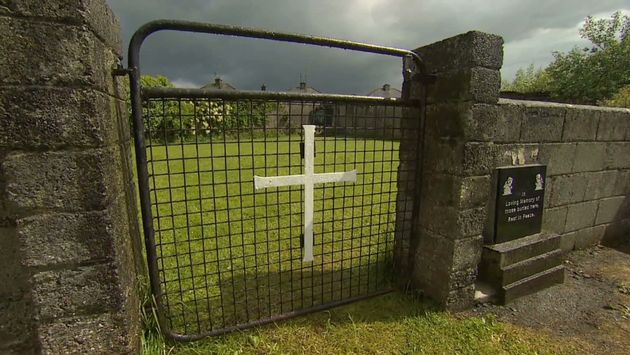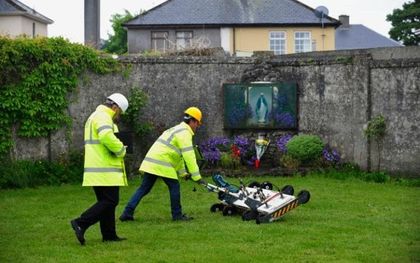DNA confirmed children ranged in age from 35 weeks to 3 years and were buried mainly in the 1950s.
 Entrance of the former home for unmarried mothers in Tuam (Ireland)./PA
Entrance of the former home for unmarried mothers in Tuam (Ireland)./PA
A mass grave containing “significant quantities” of baby remains has been discovered at a former Catholic home for unmarried mothers and their babies in Tuam, County Galway, western Ireland.
According to a commission set up to investigate alleged abuse at such homes, approximately 800 infants were found in at least 17 of 20 underground chambers, during excavations between November and February.
DNA analysis confirmed the ages of the dead ranged from 35 weeks to three years old and were buried mainly in the 1950s.
The home, which was run by the Bon Secour order of Catholic nuns, closed in 1961.
INVESTIGATING SINCE 2014
In 2014, the government ordered an investigation after Tuam historian, Catherine Corless, tracked down death certificates for nearly 800 children who were residents at the Tuam home between 1925 and 1961, but a burial record for only one child.
"Everything pointed to this area being a mass grave", said Corless, who recalled how local boys playing in the field had reported seeing a pile of bones in a hidden underground chamber there in the mid-1970s.
“WE WILL HONOUR THEIR MEMORY”
Although the findings were "not unexpected as there were claims about human remains on the site over the last number of years”, the confirmation of the discovery is “sad and disturbing”, Ireland's minister for children and youth affairs, Katherine Zappone, said.
"Up to now we had rumours. Now we have confirmation that the remains are there, and that they date back to the time of the mother and baby home, which operated in Tuam from 1925 to 1961", she added.
Zappone promised the children’s families that the government “will honour their memory and make sure that we take the right actions now to treat their remains appropriately.”
As well as the discovery at Tuam, the commission is also investigating conditions at 17 other residential institutions across the Republic of Ireland.
 Members of the excavation team. /EPA
Members of the excavation team. /EPA
ARCHBISOP OF TUAM RESPONSES
Catholic Archbishop Michael Neary of Tuam said in a homily on Sunday that he was "greatly shocked" to learn of the extent of the numbers of children buried in the graveyard at the home.
He stressed that the Archdiocese had nothing to do with the running of the institution and that any useful material the Archdiocese possessed has already been handed over to the Commission and will continue to assist investigators.
Archbishop Neary added: "Those who have suffered are uppermost in our minds and at the very heart of our prayers."
BON SECOURS SISTERS
Meanwhile, the Bon Secours sisters have pointed out that they “are fully committed to the work of the Commission regarding the mother and baby home in Tuam.”
The nuns confirmed that “on the closing of the Home in 1961, all the records for the Home were returned to Galway County Council who are the owners and occupiers of the lands of the Home.”
“We can therefore make no comment on today’s announcement, other than to confirm our continued cooperation with and support for the work of the Commission in seeking the truth about the home" the order concluded in a statement carried by thejournal.ie.
MOTHERS SEEK GENOCIDE TRIAL
In a letter to Ireland's attorney-general, the 63 members of Irish First Mothers allege that they suffered "religiously motivated grievous injuries" at the hands of those charged with taking care of them at similar institutions across the country.
"With respect to genocide, it is the religious mind-set of the perpetrator (not the victim) which is pertinent", the letter claims.
They assert that “the perpetrators were malignly motivated by their own Catholic ideological characterisation of us as a religiously defined group: a caste of so-called fallen women."
In the letter, the women also claim that they suffered "lifelong psychological injuries" because they were forcibly separated from their children.

Las opiniones vertidas por nuestros colaboradores se realizan a nivel personal, pudiendo coincidir o no con la postura de la dirección de Protestante Digital.
Si quieres comentar o